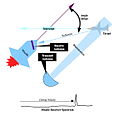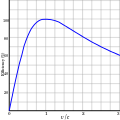Portal:Rocketry
The Rocketry Portal

A rocket (from Italian: rocchetto, lit. ''bobbin/spool'', and so named for its shape) is a vehicle that uses jet propulsion to accelerate without using any surrounding air. A rocket engine produces thrust by reaction to exhaust expelled at high speed. Rocket engines work entirely from propellant carried within the vehicle; therefore a rocket can fly in the vacuum of space. Rockets work more efficiently in a vacuum and incur a loss of thrust due to the opposing pressure of the atmosphere.
Multistage rockets are capable of attaining escape velocity from Earth and therefore can achieve unlimited maximum altitude. Compared with airbreathing engines, rockets are lightweight and powerful and capable of generating large accelerations. To control their flight, rockets rely on momentum, airfoils, auxiliary reaction engines, gimballed thrust, momentum wheels, deflection of the exhaust stream, propellant flow, spin, or gravity.
Rockets for military and recreational uses date back to at least 13th-century China. Significant scientific, interplanetary and industrial use did not occur until the 20th century, when rocketry was the enabling technology for the Space Age, including setting foot on the Moon. Rockets are now used for fireworks, missiles and other weaponry, ejection seats, launch vehicles for artificial satellites, human spaceflight, and space exploration.
Chemical rockets are the most common type of high power rocket, typically creating a high speed exhaust by the combustion of fuel with an oxidizer. The stored propellant can be a simple pressurized gas or a single liquid fuel that disassociates in the presence of a catalyst (monopropellant), two liquids that spontaneously react on contact (hypergolic propellants), two liquids that must be ignited to react (like kerosene (RP1) and liquid oxygen, used in most liquid-propellant rockets), a solid combination of fuel with oxidizer (solid fuel), or solid fuel with liquid or gaseous oxidizer (hybrid propellant system). Chemical rockets store a large amount of energy in an easily released form, and can be very dangerous. However, careful design, testing, construction and use minimizes risks. (Full article...)
Selected article -
The Astra Rocket was a small-lift space launch vehicle series designed, manufactured, and operated by American company Astra (formerly known as Ventions). The rockets were designed to be manufactured at minimal cost, employing very simple materials and techniques. They were also designed to be launched by a very small team, and be transported from the factory to the launch pad in standard shipping containers.
The Rocket name was shared by several launch vehicles. Rocket 1 was test vehicle made up of a booster equipped with five Delphin electric-pump-fed rocket engines, and a mass simulator meant to occupy the place of a second stage. Rocket 2 was a prototype similar to Rocket 1. Rocket 3 was a launch vehicle which added a pressure-fed second stage to the Delphin-powered booster. Its definitive variant, Rocket 3.3, featured a lengthened booster, and delivered satellites to orbit. Rocket 4 was to have been an all-new design for a larger, more powerful rocket. The rocket family originated in Small Air Launch Vehicle to Orbit (SALVO), a small launch vehicle powered by Astra's electric-pump-fed liquid rocket engine produced for the DARPA ALASA program. Following the end of the ALASA program, development of launch vehicle technology and systems continued, producing the Rocket family. (Full article...)
In the news
- 3 June 2025 – Russian invasion of Ukraine
- Four people are killed and 25 others are injured after Russian forces launch an MLRS rocket barrage at the centre of Sumy, Ukraine. (AP)
- 28 May 2025 – New Cold War
- More than two million documents related to Russian military procurement from a public database for contractors are published, including information on the modernization and build-up of the Russian Strategic Missile Forces, military base at Yasny, and Avangard hypersonic glide vehicle. (The Moscow Times) (Newsweek)
Topics
List articles
Things to do
 |
Here are some tasks awaiting attention:
|
Wikimedia
The following Wikimedia Foundation sister projects provide more on this subject:
-
Commons
Free media repository -
Wikibooks
Free textbooks and manuals -
Wikidata
Free knowledge base -
Wikinews
Free-content news -
Wikiquote
Collection of quotations -
Wikisource
Free-content library -
Wikispecies
Directory of species -
Wikiversity
Free learning tools -
Wikivoyage
Free travel guide -
Wiktionary
Dictionary and thesaurus





















































